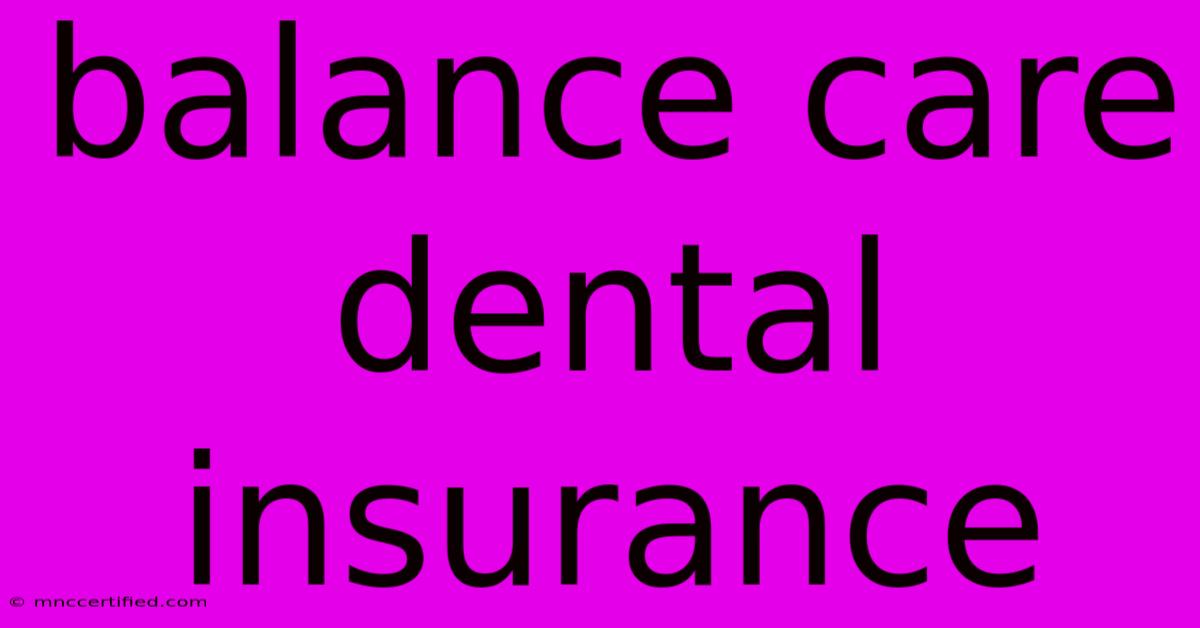Balance Care Dental Insurance

Table of Contents
Understanding Balance Care Dental Insurance: A Comprehensive Guide
Finding the right dental insurance can feel overwhelming. With so many options available, choosing a plan that fits your needs and budget is crucial. This comprehensive guide will delve into Balance Care Dental Insurance, exploring its features, benefits, coverage details, and how to determine if it's the right fit for you.
What is Balance Care Dental Insurance?
Balance Care Dental Insurance isn't a single, standalone insurance company. Instead, the term "Balance Care" often refers to a dental insurance plan offered through a network of providers or a type of dental savings plan. It's important to understand the specifics of your particular "Balance Care" plan because the coverage and costs will vary widely depending on the provider and the plan's design. Some plans might be offered through your employer, while others are available for individual purchase.
Key things to check when researching your Balance Care plan:
- Network Providers: Does the plan limit you to specific dentists and specialists? A limited network might mean you pay more out-of-pocket if you choose a dentist outside the network.
- Premium Costs: How much will you pay monthly or annually for the insurance?
- Deductible: How much will you have to pay out-of-pocket before the insurance starts covering services?
- Copay: What is your copay for routine checkups and cleanings?
- Maximum Annual Benefit: What is the total amount the plan will pay out per year?
Balance Care Dental Insurance: Coverage Details
The specifics of your Balance Care coverage depend heavily on the plan you choose. However, most dental insurance plans, including those potentially labeled "Balance Care," typically cover a range of services, including:
- Preventive Care: This usually includes regular checkups, cleanings, and X-rays. These are often covered at a higher percentage than other services to encourage preventive dental health.
- Basic Care: This often encompasses fillings, extractions, and some types of oral surgery. Coverage percentages are usually lower than preventive care.
- Major Care: This category typically covers more complex procedures like crowns, bridges, dentures, and orthodontics. These often have the lowest coverage percentage and the highest out-of-pocket costs.
What Balance Care Might Not Cover
It's crucial to review your specific plan documents carefully. Many dental plans, even comprehensive ones, may not cover:
- Cosmetic Dentistry: Procedures like teeth whitening are rarely covered by insurance.
- Implants: Coverage for dental implants can vary greatly and often requires significant out-of-pocket expenses.
- Pre-existing Conditions: Some plans may not cover treatment for dental problems that existed before the policy started.
Finding the Right Balance Care Plan (or a Suitable Alternative)
Determining if a Balance Care plan (or any dental plan) is right for you requires careful consideration of your needs and budget. Ask yourself:
- How often do I need dental care? If you have good dental hygiene and rarely need extensive treatment, a basic plan might suffice.
- What is my budget? Balance the monthly premium cost against the potential out-of-pocket expenses for services you might need.
- What are my dental needs? Do you anticipate needing major dental work in the near future? If so, a plan with better coverage for major procedures is essential.
Alternatives to Balance Care Dental Insurance
If a Balance Care plan doesn't meet your needs, explore other options like:
- Different Dental Insurance Providers: Research plans from other reputable dental insurance companies in your area.
- Dental Savings Plans: These plans offer discounts on dental services but don't provide the same comprehensive coverage as insurance.
- Health Savings Accounts (HSAs): If you have a high-deductible health plan, an HSA can help you save for dental expenses.
Conclusion: Making Informed Decisions About Your Dental Health
Choosing the right dental insurance is a crucial step in maintaining good oral health. By carefully researching your options, understanding the details of your Balance Care plan (or any plan you are considering), and comparing various alternatives, you can make an informed decision that best fits your budget and healthcare needs. Remember to always read the fine print and contact the provider directly to clarify any uncertainties. Proactive planning for your dental health is an investment in your overall well-being.

Thank you for visiting our website wich cover about Balance Care Dental Insurance. We hope the information provided has been useful to you. Feel free to contact us if you have any questions or need further assistance. See you next time and dont miss to bookmark.
Featured Posts
-
Nzs Wtc Hopes Rise With Williamson
Nov 28, 2024
-
Appleton Williams Relationship Biopics Hardest Part
Nov 28, 2024
-
Bbc Presenter Mishal Husain Departs After 25 Years
Nov 28, 2024
-
Can I Bond Myself Out Of Jail
Nov 28, 2024
-
Cash App San Francisco Office
Nov 28, 2024